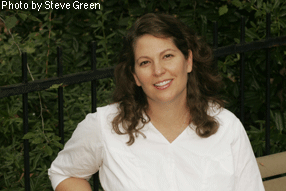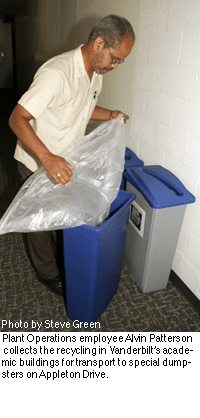New coordinator to boost campus recycling efforts
[Originally published in The Vanderbilt Register]
By Kara Furlong
 Green efforts on campus are getting a boost with the hiring of Vanderbilt’s first full-time recycling coordinator.
Green efforts on campus are getting a boost with the hiring of Vanderbilt’s first full-time recycling coordinator.
Jennifer Hackett, whose longtime advocacy for recycling was in part shaped by her experience as a Vanderbilt divinity student, was named to the position in July.
Though Vanderbilt has had a recycling program since 1990 and efforts over the years have been aided by individuals and student volunteers, Hackett’s hiring marks the first time those efforts will be coordinated by a full-time administrator.
The process to formalize campus recycling began last November, when Hackett was hired by Plant Operations on an interim basis to do an assessment of Vanderbilt’s current recycling capabilities.
“I went to about 65 academic and administrative buildings and did interviews with staff and faculty and sometimes students on almost every floor, examining all the break rooms and copy rooms and public spaces to see what we currently have in place and what was missing,” Hackett said.
“The No. 1 question that people asked me was ‘What really happens to my recycling? Are you guys just throwing it out?’” she said. “And the answer is no – your recycling really is being recycled.”
Hackett explained Vanderbilt’s current system: Around 400 individual recycling containers are stationed in academic and administrative buildings, residence halls and common areas throughout the Peabody College and central campuses. These containers can accept what Hackett calls “the big three” – No. 1 and No. 2 plastics, aluminum, and paper of all kinds, including paperboard, such as the weight from which cereal boxes are made.
 A single Plant Operations employee, Alvin Patterson, empties the containers located in the academic and administrative buildings and transports the contents to large recycling dumpsters located on Appleton Drive on the Peabody campus. Student volunteers, such as those involved with SPEAR (Students Promoting Environmental Awareness and Recycling), handle transporting the recyclables gathered in residence halls.
A single Plant Operations employee, Alvin Patterson, empties the containers located in the academic and administrative buildings and transports the contents to large recycling dumpsters located on Appleton Drive on the Peabody campus. Student volunteers, such as those involved with SPEAR (Students Promoting Environmental Awareness and Recycling), handle transporting the recyclables gathered in residence halls.
From the dumpsters, vendor Smurfit-Stone collects the recycling, which it takes to its Nashville-area plant for processing.
“Smurfit-Stone is interesting as a vendor because it does all parts of the loop,” Hackett said. “They pick up our recycling, they have a facility where they recycle it themselves and then they turn it into products made from recycled goods.” The money Vanderbilt receives for its recyclable materials goes back into funding the recycling program.
Between Vanderbilt Medical Center, which heads up its own recycling efforts, and the university campus, Vanderbilt recycled more than 5 tons of plastic, nearly 10 tons of aluminum, some 283 tons of paper and more than 433 tons of cardboard last year.
Hackett’s assessment found that while segments of the Vanderbilt community fall at either end of the spectrum – those totally disinterested in recycling vs. those “extremely interested in doing anything and everything they can to recycle” – the majority of people on campus fall somewhere in the middle: perfectly willing to recycle as long as it is reasonably easy to do so.
“The smart things that people are already doing include putting paper collection containers next to copy machines, or choosing to do desk-side recycling, where they collect their own paper recyclables and walk them to a central recycling location during a stretch break,” Hackett said. “There’s also a variety of drink container recycling scattered throughout buildings and public walk areas, which is great, because we are such a mobile campus.
“That’s what’s in place already; we are hoping to increase and spread out the services so that students, faculty and staff can recycle in almost every place they would be throwing something away,” she said.
Hackett said the assessment found a definite need for more containers, which the university will begin to add in a pilot program starting this fall. She said the university will be looking at how the increased number of containers might necessitate more staff to accommodate them, as well as how to make Plant Operations’ and the student volunteers’ collection efforts sustainable over the long term.
For Hackett, being named recycling coordinator for Vanderbilt is more than just the latest stop on a career path; recycling is a large part of her life’s work. The Nashville native recalls attending her first Earth Day celebration at Riverfront Park as a teenager.
“I was given some recycling facts about how many aluminum cans it would take to power X-amount of electricity, how if you recycle a certain number of newspapers you can save a certain number of trees, and it just ‘clicked.’ It made so much sense to me,” Hackett said. “Suddenly, this was something that I could do and it was easy.”
As an undergraduate at Ohio’s University of Dayton, Hackett became an advocate for recycling efforts within her college dorm. Following graduation, she spent a year volunteering with AmeriCorps and was charged with establishing a recycling program for the Dayton Metro parks system.
But Hackett’s burgeoning interest in recycling took on new meaning as a Vanderbilt Divinity School student in the late ’90s. “I took (now emerita professor) Sallie McFague’s ‘Ecological Theology’ class, and we discussed ecology and preservation of green spaces in a very spiritual way – a really comprehensive, broader understanding of what the Earth and the people who live upon its relationship came to be.” As a final project, Hackett proposed establishing a recycling program for the divinity school that would put class discussion into practice. The program is still going today.
As part of her divinity education, Hackett elected to take “The Management of Environmental Issues” at the Owen School and audited an environmental law class to become better versed in the subject, before graduating with a master’s of divinity degree in 2000.
After pursuing other career interests for several years, including a two-year stint at the Nashville YWCA working with women surviving domestic violence and serving as associate director of the Margaret Cuninggim Women’s Center at Vanderbilt from 2002 to 2006, Hackett is happy to again be focusing on her early passion.
“I’m really excited to put all of my interests together, and having done the logistical leg work for the last several months, it’s great to finally be making things happen,” she said.
Part of Hackett’s job will be educating departments, offices and student groups on what materials can be recycled through Vanderbilt’s program, because her assessment found that many were operating on outdated and conflicting information. She also plans to be a hub of information on everything from where employees working in non-Vanderbilt-owned buildings can do their recycling to how employees may utilize the university’s programs for recycling special materials, such as compact fluorescent light bulbs, ink cartridges, computers and computer monitors. Much of that information is already gathered on SustainVU (www.vanderbilt.edu/sustainvu), and Hackett will be updating the site’s recycling section frequently.
To launch its refocused efforts, Plant Operations will host a recycling open forum from 5 to 6 p.m. Sept. 5 at the Bishop Joseph Johnson Black Cultural Center.
“This will be an opportunity for the Vanderbilt community to give us insight and feedback about where their interests lie in terms of recycling on campus,” Hackett said. “I know there are some people who have had thoughts for a long time and haven’t really had a place or a person to give them to, so we’re glad to be doing this.”
Hackett is out to prove that recycling isn’t just for granola-crunching nature lovers, but rather a practice everyone on campus can – and should – embrace.
“Fiscally, it costs the university more money to dispose of garbage per ton than it does to dispose of recycling per ton, and then recycling has that added bonus of actually being worth something,” Hackett said. “Garbage is building up all the time, while recycling comes back for us to use again.
“Civically, it’s a responsible way to keep the landfill in our area from filling up. Environmentally, it’s an easy way to help protect the finite resources of our planet,” she said.
“I think for a long time recycling seemed like an optional thing to do as opposed to something that makes so much sense fiscally and environmentally,” Hackett said. “As awareness has grown of why it’s a good idea to do green things, the notion of centralizing our efforts has become a priority.”
For more information about recycling on campus, visit www.vanderbilt.edu/sustainvu, call 34-EARTH or e-mail recycle@vanderbilt.edu.

Leave a Response